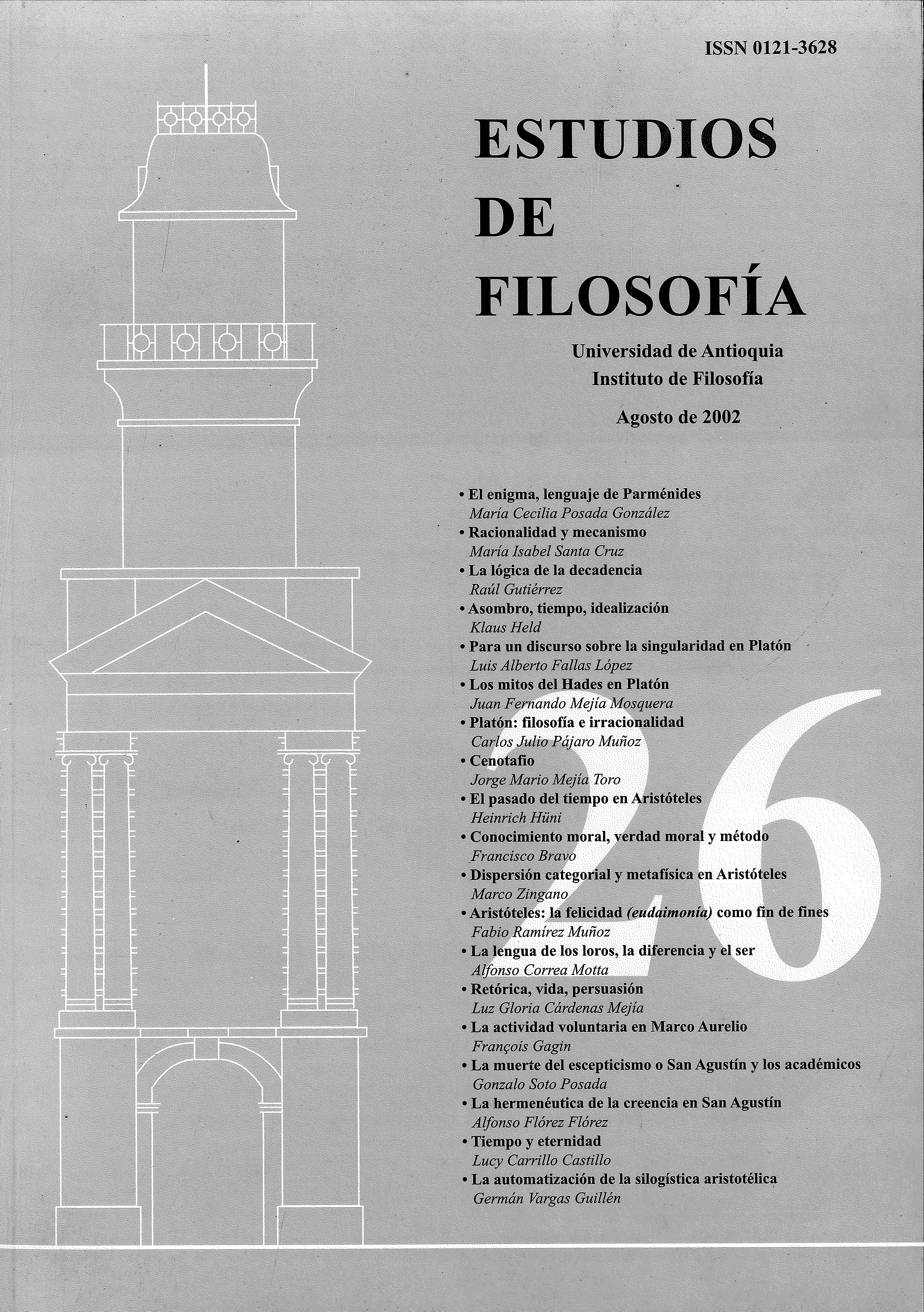Automation of aristotelian syllogistic. Logical and phenomenological foundations of the automaton “Syllogismos”
DOI:
https://doi.org/10.17533/udea.ef.14983Keywords:
Syllogismos, automation, Aristotle, phenomenology, axioms, Artificial IntelligenceAbstract
The objective of this article is to show the foundations of the research in which the device Syllogismos have been developed, an automaton (hat: performs inference, identifies the figure and the mode of syllogisms, recognizes and differentiates enthymeme and sophisms; this was developed in Prolog -a platform of Artificial Intelligence (Al)- as pari of a research project tending to represent computationally the mind just as Aristotle conceived it for the case of logic in Organon, for the case of persuasion in Rhetoric, etc. In § 1. the research context is presented: in § 2. the contribution of syllogistics to Al is characterized as well as to the philosophy of the mind: in § 3. the limitations of Aristotelian logic are established for its automation: in f 4. it studies the perspective of research opened with automation projects
Downloads
References
ERICSSON, Anders K. & SIMON, Herbert A. (1993). Protocol Analysis. Verbal reports as data. Massachusetts: The MIT Press, 443 p. DOI: https://doi.org/10.7551/mitpress/5657.001.0001
Da COSTA, Newton C. & LEWIN, Renato A. (1995). Lógica para consistente. En: Lógica. Enciclopedia Iberoamericana de Filosofía. No. 7. Madrid: Ed. Trotta, p. 185-204.
DREYEUS, Hubert, (with Stuart Dreyfus). (1985). From Socrates to Expert Systems: The Limits of Calculative Rationality, en: MITCHAM, Carl & HUNINGLAlois. Philosophy and Technology II: Information Technology and Computers in Theory and Practice. Boston Studies in the Philosophy o f Science Series. Reidel. DOI: https://doi.org/10.1007/978-94-009-4512-8_9
FALGUERA LÓPEZ, José L. & MARTÍNEZ VIDAL, Concepción. (1999). La lógica clásica de primer orden. Estrategias de deducción, formalización y evaluación semántica. Madrid: Ed. Trotta, 482 p.
MALDONADO GRANADOS, Luis Facundo. (2001). Análisis de protocolos: posibilidad metodológica para el estudio de procesos cognitivos. Bogotá: Universidad Pedagógica Nacional, 42 p.
MÜNCH, D. (Hrsg.). (1992). Kognitionswissenschaft. Grundlagen, Probleme, Perspektiven (stw 989). Frankfurt: Suhrkamp.
MÜNCH, Dieter. (1993). Intention und Zeichen. Frankfurt: Editorial Suhrkamp, 323 p.
MÜNCH, Dieter. (1990). The Early Work of Husserl and Artificial Intelligence, en: Journal of the British Society for Phenomenology 21,107-120. DOI: https://doi.org/10.1080/00071773.1990.11006889
ROBLES GARCÍA, José A. (1995). Historia de la lógica, en: Lógica. Enciclopedia Iberoamericana de Filosofía, No. 7. Madrid: Ed. Trotta, p. 49-69.
SEARLE, Jhon R. (1990). Mentes, cerebros y máquinas, en: BODEN, Margaret (comp). Filosofía de la Inteligencia Artificial. México: F.C.E., 1994, p. 82-104.
SEARLE, Jhon R. (1992). Intencionalidad. Madrid: Ed. Técnos, 281 p.
SEARLE, Jhon R. (1996). El redescubrimiento de la mente. Barcelona: Ed. Crítica; 269 p.
SEARLE, Jhon. (1984). Mentes, cerebros y ciencias. Barcelona: Ed. Cátedra, 1994,111 p.
SOKOLOWSKI, Robert. (1977). The ideal existence of the judgments, en: Phänomenologische Forschungen, (4)77;p. 86-102.
SOKOLOWSKI, Robert. (1993). Inteligencia natural e inteligencia artificial, en: GRAUBARD Stephen (comp). El nuevo debate sobre la inteligencia artificial. Barcelona: Ed. Gedisa, 59- 80.
VARGAS GUILLEN, Germán. (1999a). Fenomenología e Inteligencia Artificial, en: Estudios de Filosofía, No. 19-20, p. 91-130. DOI: https://doi.org/10.17533/udea.ef.335781
VARGAS GUILLÉN, Germán. (1999b). La noción husserliana del “eidos” platónico, en: Praxis Filosófica. Nueva Serie Nos. 10/11,1999.
VARGAS GUILLÉN, Germán. (2001). Aristóteles y la automatización de la lógica. Una lectura desde la Inteligencia Artificial, en: Estudios de Filosofía, No. 23-24.
VARGAS GUILLÉN, Germán. (2001). Awale. Juego de Discernimiento Moral. (Software realizado en Prolog). Bogotá: Universidad Pedagógica Nacional.
VARGAS GUILLÉN, Germán. (2002). La representación computacional de dilemas morales. Bogotá: Universidad Pedagógica Nacional, Tesis Doctoral (bajo la dirección del Prof. Dr. Luis Facundo Maldonado G Ph. Dr.), 398 p.
Downloads
Published
How to Cite
Issue
Section
Categories
License
Copyright (c) 2002 Estudios de Filosofía

This work is licensed under a Creative Commons Attribution-NonCommercial-ShareAlike 4.0 International License.
Authors who publish with this journal agree to the following terms:
1. The Author retains copyright in the Work, where the term "Work" shall include all digital objects that may result in subsequent electronic publication or distribution.
2. Upon acceptance of the Work, the author shall grant to the Publisher the right of first publication of the Work.
3. The Author shall grant to the Publisher a nonexclusive perpetual right and license to publish, archive, and make accessible the Work in whole or in part in all forms of media now or hereafter known under a Creative Commons Attribution-NoCommercia-ShareAlike (CC BY-NC-SA 4.0), or its equivalent, which, for the avoidance of doubt, allows others to copy, distribute, and transmit the Work under the following conditions: (a) Attribution: Other users must attribute the Work in the manner specified by the author as indicated on the journal Web site;(b) Noncommercial: Other users (including Publisher) may not use this Work for commercial purposes;
4. The Author is able to enter into separate, additional contractual arrangements for the nonexclusive distribution of the journal's published version of the Work (e.g., post it to an institutional repository or publish it in a book), as long as there is provided in the document an acknowledgement of its initial publication in this journal;
5. Authors are permitted, and Estudios de Filosofía promotes, to post online the preprint manuscript of the Work in institutional repositories or on their Websites prior to and during the submission process, as it can lead to productive exchanges, as well as earlier and greater citation of published work (see The Effect of Open Access). Any such posting made before acceptance and publication of the Work is expected be updated upon publication to include a reference to the Estudios de Filosofía's assigned URL to the Article and its final published version in Estudios de Filosofía.















